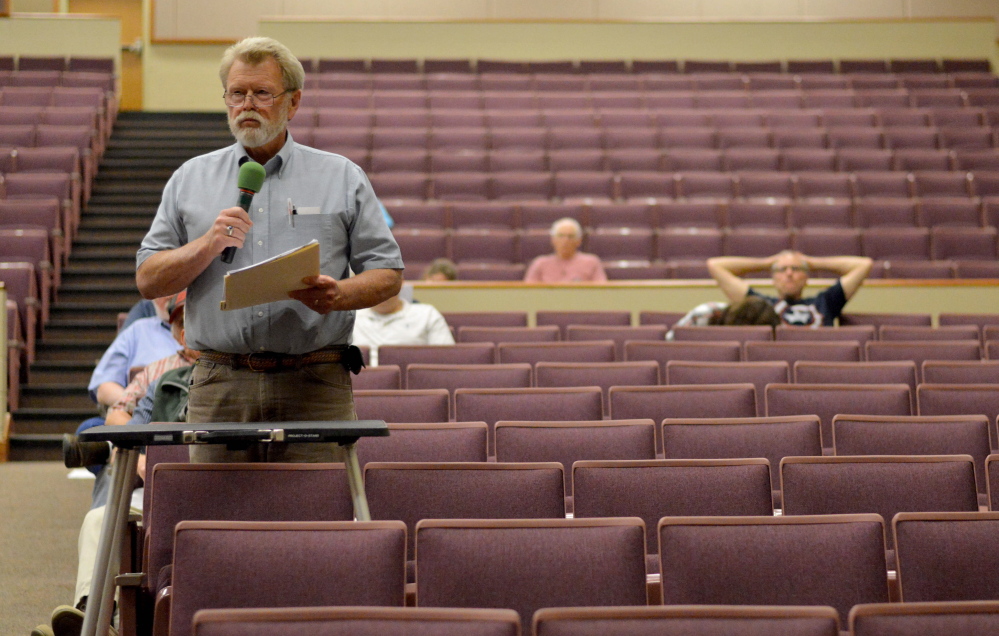OAKLAND — The Regional School Unit 18 administration intends to use $463,520 in state funding to balance its budget partially after uncovering a half-million-dollar revenue miscalculation.
The consequence of the error is that RSU 18 won’t be able to add to its depleted surplus and still will have a $101,010 revenue shortfall to cover in the budget, according to Superintendent Gary Smith.
The RSU board of directors voted Tuesday to follow the advice of legal counsel and use $463,520 in state general purpose aid to the district and ask administrators to help find $101,010 in savings in the existing school budget to offset $564,530 that was not included, but should have been, in article 14 of the warrant approved June 18.
That article asked RSU 18 to appropriate $3.3 million in additional local money.
On the plus side, the mistake means that the five RSU 18 towns — Belgrade, China, Oakland, Rome and Sidney — will pay less in taxes than anticipated because the district had to reduce local assessments. According to Smith, Oakland will see the biggest reduction in its assessment, $143,425; followed by Belgrade, $141,081; China, $109,145; Sidney, $105,461; and Rome, $64,618.
In an interview earlier Tuesday, Smith couldn’t explain how the error occurred, except to say that it was an oversight that would not be repeated.
Tim Russell, a Sidney selectman who has been a vocal critic of the RSU 18 budget, said that the frequency of errors on the part of the RSU 18 administration is concerning. Russell originally identified a Sidney-Oakland transposition mistake in an early version of the budget that was later fixed but never explained to officials in those towns. At the June 18 budget meeting, he also pointed out that the budget articles, as written, couldn’t be considered “open”, meaning subject to being increased or decreased, even though the school board intended them to be.
“Somebody should be on top of this stuff, and it is starting to be incompetence,” Russell said Tuesday. “I’m thankful all of this stuff is getting caught now, because if it was caught six months from now, it would just be a huge mess.”
After Tuesday night’s vote, Russell said the board had no choice but to use the state money to help fill the gap.
“Their saving grace is they got as much money from the state as they did. Otherwise, they would have had to make drastic cuts in the budget,” he said.
Officials originally planned to use that money to help build the surplus account, which now is down to about $200,000.
Board discussion Tuesday was muffled by a loud air conditioner that roared from the back of the room at the superintendent’s office. Someone turned it off after audience members said they could not hear what was being said.
Before the vote, board member Andy Cook of Rome said the $564,5300 mistake was the second “glitch” that had occurred in the budget, and he and others are anxious about that. He said he hoped no more such problems occur.
Smith said that since April, his pace of work has been breakneck and included creating a budget and working through contract negotiations along with his other responsibilities. His position was made more difficult by the lack of an assistant superintendent for part of the year, he added.
“I was stretched thin,” Smith said. “It’s not an excuse; it’s just a reality.”
The problem boils down to the roughly $564,500 that China needs to pay to the district to cover the cost of tuition. In the consolidation agreement that established the school district, China was given the option to send high school students to schools outside the district, but it had to pay the differential cost compared to the cost of sending a student to Messalonskee High School.
The tuition money is in addition to the local taxes China pays to fund education in the district, and it is treated as a separate revenue line in the district budget. The revenue is included on the school district budget meeting warrant that outlines the additional local funds — the amount above the state’s essential programs and services model — that the towns need to raise for the year.
At the June 18 budget meeting, the revenue line — then $3.3 million — was adopted by voters. The $564,530 that China owed for tuition was supposed to have been added to that amount before the additional local assessment for the five towns was calculated, but it was not.
That meant that when administrators picked up the mistake, they had to reduce the municipal assessments to $2.7 million. After adding the China tuition money, that meant there was another $564,530 shortfall that the district had to overcome to fill out its total $34.4 million spending plan, Smith said.
The district discovered its mistake after the issue of China’s tuition was brought up last Tuesday at a special Oakland Town Council meeting, Smith said. That meeting was convened to discuss another mistake in the budget in which the amount of additional taxes from Sidney and Oakland were transposed in an early version of the budget. Oakland ended up having to pay more taxes than it thought, because the RSU 18 office never told Oakland officials about the mistake.
Following that meeting, the board tried to convene a special meeting to discuss the mistake but couldn’t get a quorum, Smith said. The deadline to hold a makeup budget meeting is 30 days from the last meeting, and the district needs seven days to post warrants, Smith said. That meant that the district would have had to post warrants Friday or Saturday, Smith said.
Instead, RSU 18 board Chairman Elwood Ellis, of China, and members Mary-Anne LaMarre and Rick Stubbert, of Oakland, met with Smith last Thursday. Although no formal action was taken, the direction given to the administration was to use the $463,520 RSU 18 received from the state as part of a $25 million education funding plan passed by the Legislature in June to plug the budget hole.
The only alternative was to cut the $564,530 from the budget, Smith said.
Even with the added revenue, the district still will have to find $101,010 in savings in its budget over the next year.
LaMarre and board member Jim Isgro of Sidney said at the meeting that the mistake does give some property tax relief to district communities.
LaMarre said constituents have been asking for a reduction in taxes, so the fact that the towns will pay less in taxes than anticipated is a good thing.
“This is good news for our taxpayers,” she said. “We have to look at it that way.”
Staff writer Amy Calder contributed to this report.
Peter McGuire — 861-9239
Twitter: PeteL_McGuire
Send questions/comments to the editors.




